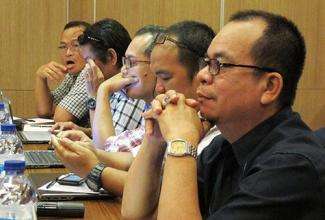The Samdhana Institute along with its partners in Kalimantan held a Partners Regional Meeting over the course of two days (23-24 March 2015) in order to gain lessons learned from small grants distributed. The meeting was held at Hotel Horison in Bogor and specificially discussed work strategies developed and discussed again with various political dynamics and government policies that are developing. Afterwards, the 2015 work plan was compiled and a post-2015 discussion was held.
2015 is the sixth year of the Community Preparedness Program on climate change and the REDD+ scheme whereby Samdhana has been providing support to NGO partners and Indonesian communities. Funding support provided by Norad (Norwegian Government) and CLUA (Climate and Land Use Agency). During several previous meetings, the Kalimantan regional partners have developed a Kalimantan Change Roadmap. There are 9 strategic issues that have been established in 2013, below are some important dynamics and notes:
“Samdhana programs are very relevant to what our friends are doing in the field. 2015 is the final year of the Samdhana and NORAD program. We hope that during subsequent planning there will be continuity and that we can accommodate all, and advocate for government to engage communities,empower communities with ways that are more sustainable. That is what we have learned thus far,†explained Samdhana's program director, Budi Raharjo.
During a presentation on activity development, several achievements,constraints and future challenges were conveyed. Partners exchanged updated informated in regard to the social and ecological crises occurring in Kalimantan.
Matheus Pilin from Perkumpulan Pancur Kasih in regard to their success in completing facilitation and participatory mapping in 383 villages over a span of 1.6 million hectares, as well as responding to UU Desa (Village Law) and MK 35 (Constitutional Court Decision No. 35), which connects local issues with work cabinet agendas in regard to indigenous area recognition, food sovereignty, community economy and indigeous village empowerment. However, the ecological crisis is still also still an issue.
“The issue of facilitiation or strengthening at the community level will never end, because the stronger they become, the stronger the challenges become. The models we use are also imitated by investors,†he added.
As with SLPP in Central Kalimantan, since 2012 have been encouraging communities around forest areas through mapping in regard to REDD+. In 2013, this became a land use planning document and used as spatial planning advocacy material. There was also mapping of Ulin indigeous forest, covering 16,000 ha. In South Kalimantan, South Kalimantan SLPP presented their success in training facilitators to map areas and analyse spatial planning policies, one of them was working on South Kalimantan's Spatial Plan.
During the Jokowi-JK era, there have been some new policies regarding natural resource management. Starting from Ministry changes ( Environment and Forestry Ministry, Agrarian and Spatial Planning Ministry etc), Implementation of Law No. 6 of 2014 on Villages, Law No. 23 of 2014 on Regional Governance etc. Including an elaboration of Nawacita in Medium Term Development Plan. Various opportunities and threats developed by the current government need to be responded and addressed quickly and accurately.
Team members at Chalid Muhammad's Transition Office added that there has been suggestions ot establish an adhoc body under the president to deal with agrarian disputes, the draft for this is with the Seskab (District Secretary) office. While waiting for the adhoc body to be established, the Minister for Environment and Forestry has formed the Environment and Forest Dispoute Body.
They added that a minimum of 12.7 million hectares of forest have to be community managed. This figure is for production forests that are not encumbered with rights, protected forests or conservation areas or production forests encumbered with rights where companies are obliged to have 20 percent of their areas to be managed by communities. “The scheme of 12.7 (sic: million hectares) can be through indigenous forests, village forests, community Conversion forests, or Community forests. Opportunities are available if a village manages 1000 hectares. This means that there will be 12700 villages. The General Directorate of Social Forestry and Environmental Partnership will at the very least look after the 12.7 million hectares. Conflict resolution will also be part of this directorate's mandate,†explained Chalid. Martua T Sirait from Samdhana also refined information in regard to the National Movement to Save Natural Resources (GNSPSDA) that has been recently released. The KPK (Anti-Corruption Commision) first started working on forestry issues in 2010, namely creating a review on forestry. The GNSPSDA looks at forestry,mining,estate crops and maritime resources.
CSO is tasked with reviewding forest area inagurations done by the Environment and Forestry ministry. The ministry suddenly expanded the areas they inagurated from 14 percept to 68 percent.
“This needs to be examined, we have to be proactive in examining documents. The map attachments have to be checked out and we have to compare it to the participatory maps that we have done,†Martua said.
The Samdhana Kalimantan Regional Partners Meeting identified several important changes. The roadmap review with various dynamics and important achievements the ecological and social crisis still hasn't passed, the social movement still continues and the constraint is a government that is not yet fully responsive. Including a number of policy changes are challenging, changes in policy are a new opportunity for the movement and new movement and work strategies are needed.
The meeting was attended by 13 of the 14 partners, namely Perkumpulan Pancur Kasih, Perkumpulan SAMPAN, Lanting Borneo, LPS AIR, Yayasan Swandiri, PD AMAN Kapuas Hulu, LBBT, POKKER SHK, PW AMAN Central Kalimantan, Yayasan Tahanjungan Tarung, SLPP South Kalimantan,
SLPP Central Kalimantan dan BRWA West Kalimantan. National partner organisations were also present. (JKPP, AMAN, BRWA, Partnership and others).




